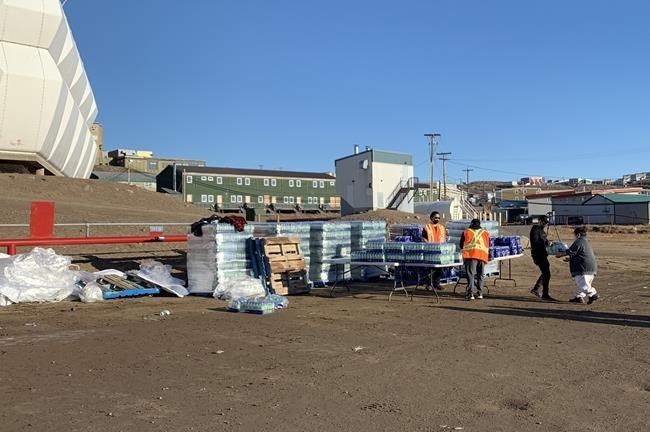IQALUIT, Nunavut — A group of companies in Nunavut has teamed up to help recycle thousands of plastic water bottles that have been shipped to Iqaluit during the capital city's water crisis.
Iqaluit's tap water hasn't been drinkable for a week after it was found to contain fuel. As a result, shipments of bottled water were sent to the city of about 8,000 people and distributed to residents for free.
But with no recycling facility, piles of plastic bottles are bound to end up in Iqaluit's landfill.
A partnership between Nunavut Sealink and Supply, Baffinland Iron Mines, Arctic Co-operatives and the Qikiqtaaluk Corporation aims to ship the used bottles to recycling facilities in Southern Canada.
"The sheer volume of water that we brought in is going to have an environmental impact on the city's landfill," said Brian Tattuinee, business development manager with Nunavut Sealink and Supply. He said people should hold on to their plastic bottles for recycling.
Arctic Co-operatives, with support from the Nunavut government, has flown 250,000 bottles to Iqaluit. Another 500,000 are on the way.
The used bottles are to be packed in sealift crates and sent south by ship before the ice freezes.
Arctic Co-operatives already has an aluminum can recycling program with several schools across the territory that works the same way, with cans sent to Southern Canada by ship.
Drop-off locations made out of recycled sealift containers are to be set up across the city hopefully sometime this week, Tattuinee said.
"We don't want to wait too long for people to collect. Because while collecting they may end up just throwing them out," he said.
At a Tuesday council meeting, the city extended its state of emergency related to the water crisis for seven more days.
Amy Elgersma, Iqaluit's chief administrative officer, said the city has a team of experts working on the problem. A tank in the city's water treatment plant that contained fuel has been pumped out and bypassed.
Elgersma said the city is still flushing the its water distribution system and will likely extend the flushing further into the week.
Soil and groundwater samples are also being taken from the area around the water treatment plant, but it's still unknown exactly how fuel entered the water system.
Iqaluit residents had complained since Oct. 2 that their tap water smelled like fuel. Test results that came back last Friday confirmed those reports.
Dr. Michael Patterson, Nunavut's chief public health officer, said last week that the amount of fuel consumed by residents who drank the contaminated tap water will not have long-term health impacts.
This report by The Canadian Press was first published Oct. 19, 2021.
___
This story was produced with the financial assistance of the Facebook and Canadian Press News Fellowship.
Emma Tranter, The Canadian Press



